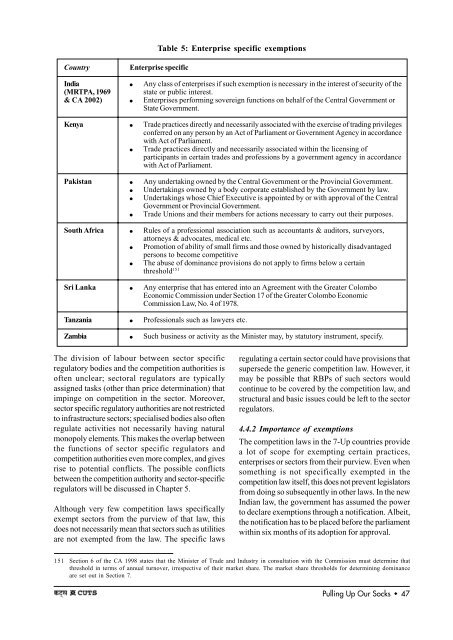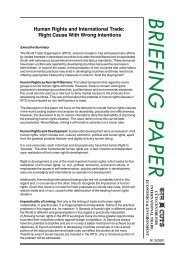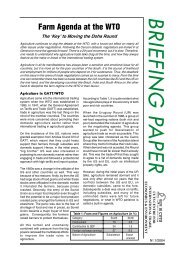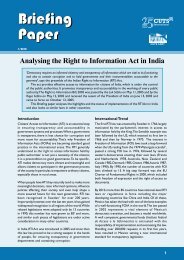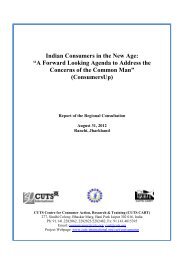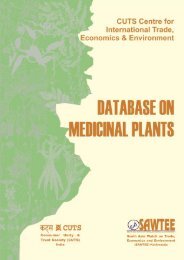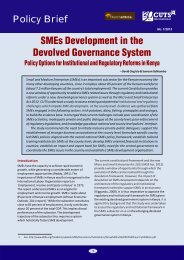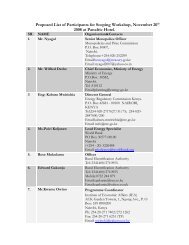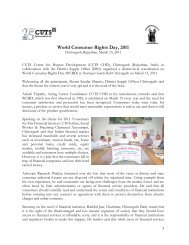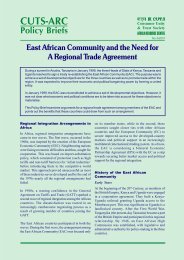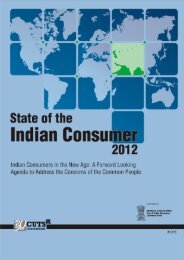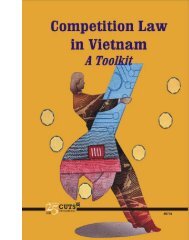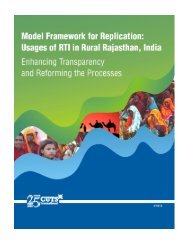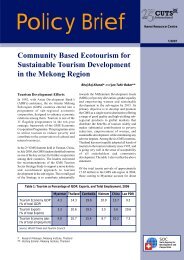Final Report - World Trade Organization
Final Report - World Trade Organization
Final Report - World Trade Organization
Create successful ePaper yourself
Turn your PDF publications into a flip-book with our unique Google optimized e-Paper software.
Table 5: Enterprise specific exemptions<br />
Country<br />
Enterprise specific<br />
India<br />
(MRTPA, 1969<br />
& CA 2002)<br />
Kenya<br />
Pakistan<br />
South Africa<br />
Sri Lanka<br />
Tanzania<br />
Zambia<br />
l<br />
l<br />
l<br />
l<br />
l<br />
l<br />
l<br />
l<br />
l<br />
l<br />
l<br />
l<br />
l<br />
l<br />
Any class of enterprises if such exemption is necessary in the interest of security of the<br />
state or public interest.<br />
Enterprises performing sovereign functions on behalf of the Central Government or<br />
State Government.<br />
<strong>Trade</strong> practices directly and necessarily associated with the exercise of trading privileges<br />
conferred on any person by an Act of Parliament or Government Agency in accordance<br />
with Act of Parliament.<br />
<strong>Trade</strong> practices directly and necessarily associated within the licensing of<br />
participants in certain trades and professions by a government agency in accordance<br />
with Act of Parliament.<br />
Any undertaking owned by the Central Government or the Provincial Government.<br />
Undertakings owned by a body corporate established by the Government by law.<br />
Undertakings whose Chief Executive is appointed by or with approval of the Central<br />
Government or Provincial Government.<br />
<strong>Trade</strong> Unions and their members for actions necessary to carry out their purposes.<br />
Rules of a professional association such as accountants & auditors, surveyors,<br />
attorneys & advocates, medical etc.<br />
Promotion of ability of small firms and those owned by historically disadvantaged<br />
persons to become competitive<br />
The abuse of dominance provisions do not apply to firms below a certain<br />
threshold 151<br />
Any enterprise that has entered into an Agreement with the Greater Colombo<br />
Economic Commission under Section 17 of the Greater Colombo Economic<br />
Commission Law, No. 4 of 1978.<br />
Professionals such as lawyers etc.<br />
Such business or activity as the Minister may, by statutory instrument, specify.<br />
The division of labour between sector specific<br />
regulatory bodies and the competition authorities is<br />
often unclear; sectoral regulators are typically<br />
assigned tasks (other than price determination) that<br />
impinge on competition in the sector. Moreover,<br />
sector specific regulatory authorities are not restricted<br />
to infrastructure sectors; specialised bodies also often<br />
regulate activities not necessarily having natural<br />
monopoly elements. This makes the overlap between<br />
the functions of sector specific regulators and<br />
competition authorities even more complex, and gives<br />
rise to potential conflicts. The possible conflicts<br />
between the competition authority and sector-specific<br />
regulators will be discussed in Chapter 5.<br />
Although very few competition laws specifically<br />
exempt sectors from the purview of that law, this<br />
does not necessarily mean that sectors such as utilities<br />
are not exempted from the law. The specific laws<br />
regulating a certain sector could have provisions that<br />
supersede the generic competition law. However, it<br />
may be possible that RBPs of such sectors would<br />
continue to be covered by the competition law, and<br />
structural and basic issues could be left to the sector<br />
regulators.<br />
4.4.2 Importance of exemptions<br />
The competition laws in the 7-Up countries provide<br />
a lot of scope for exempting certain practices,<br />
enterprises or sectors from their purview. Even when<br />
something is not specifically exempted in the<br />
competition law itself, this does not prevent legislators<br />
from doing so subsequently in other laws. In the new<br />
Indian law, the government has assumed the power<br />
to declare exemptions through a notification. Albeit,<br />
the notification has to be placed before the parliament<br />
within six months of its adoption for approval.<br />
151 Section 6 of the CA 1998 states that the Minister of <strong>Trade</strong> and Industry in consultation with the Commission must determine that<br />
threshold in terms of annual turnover, irrespective of their market share. The market share thresholds for determining dominance<br />
are set out in Section 7.<br />
Pulling Up Our Socks w 47


